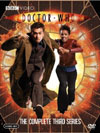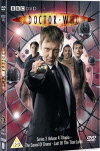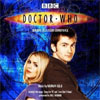DVD Extras (box sets only) include:
First of all is the Earthly setting itself. We've seen too much of Earth in the past three years, and while we've probably had more alien planet settings this year than before, they've all been for the shorter stories. The big stories have blown all chances at taking us across the galaxy as they should. Uggh. Worse is the fact that the program's recent obsession with the British Government continues unchecked until it becomes, essentially, the holy grail. Back in "Aliens of London" (story no. 164), Russell Davies had something poignant to say about world leadership making the exercise worthwhile. Here, it oozes a sense of being overused, and goes far to make the Master's plans feel far more small-scale than what this show deserves, particularly for a finale. Thirdly, the manner in which the returning arch-villain of the Master has been written is a disappointing injustice. Having decided to rely on once-again-over-used cell phone technology for his powers of mesmerism and mass-hypnosis, our evil mastermind now feels he has little need for any sense of his former charm, charisma, and elegance, and decides instead that he can be as obnoxious, irritating, and ridiculous as he pleases and still get away with it. It goes down with Doctor Who fans about as well as Jar Jar Binks did with Star Wars fans. In other words, don't be surprised to see a hacked fan edit of this story with a line and circle over the Master's face, advertising "70% less idiot" on the front cover.
Who's That Under Your Spell?Poor plot mechanics are also at work to make this far less than believable, by having virtually none of the hypnotized masses get any screen time whatsoever. We see character after character getting irritated and upset at the Master's shenanigans, but not what is compelling them to continue to accept his rule. Where are the shots of the faces of those who are mesmerized by the Master's power? This problem is particularly profuse in one specific room - the flight deck of the Valiant. This room spends too much time being full of people who want to get at the Master, who preens and dances openly in front of them for a year, and they can't get at him.Presumably, this room is constantly under guard by UNIT troops, or American secret service agents, or United Nations secret service agents, or U.S. presidential body-guards - it is pathetically left unclear which. All we do know is that it's anyone but the Saxon-ruled British Army, who lost jurisdiction several scenes prior to the introduction of the flight deck. Why wouldn't this armed contingent have opened fire on the Toclophanes the minute hostilities broke out? Why wouldn't they have arrested the idiot "British" politician who ordered the aliens to fire on their commander and chief? Why wouldn't UNIT troops figure out within a year that it isn't a healthy idea to support the dangerous criminal and escaped prisoner (whose recapture is written into standing orders as their number A1 priority) while he tortures their scientific advisor? Whoever the troops & gun-wielders on the flight deck are, scene after scene, you'd think they also would be equally keen to put an end to Master Saxon's rule. Why should the troops not hate the Master as much as Martha's family, when both parties are essentially exposed to the same view of him? The troops' reactions and motivations at many of the events and turning points that occur here is critical to any party maintaining the upper hand, and would go far to help sell the idea of the hypnotic network that the Master has built, yet they are all but ignored. It all points to the absence of a healthy goals vs. barrier structure for the middle act of the plot, to provide challenges which the Doctor and co. should be able to sink their teeth into. The second episode is particularly disastrous in this regard. After having roped in Captain Jack Harkness, and three members of Martha's family, Davies gives this large recurring cast nothing to do in the finale other than get locked in the prisoner dynamic, and most idiotically, keeps the Doctor locked in it with them as well. A good chunk of the screen time is devoted to Martha and some minor guest characters who only appear in the second half of this story, producing essentially the third Doctor-less story of the season. Sadly, this is also the least effective one of the bunch. Martha's story strand gets a few interesting beats, particularly with the capture of a Toclophane and the discoveries made in the presence of Professor Docherty. But in the end, Martha's efforts prove to have been not in support of resolving the conflicts of the story, but all rather to facilitate the return of the Doctor and let him resolve the conflicts with less than five minutes of screen time left to tackle the major challenges. And so, in her own partly disguised way, she's really just running around looking for the return of the Doctor - a thumbs down motivation for any Doctor-less story. This is such an antithesis of a great story, one shakes one's head wondering what the production team were thinking, or how they can sit and swoon over how great they still think it is on the DVD audio commentary. Having massive logistical complications for a story and figuring out how to pull it all off on time and on budget doesn't necessarily produce a great story. Creating new worlds and alien cultures in which to set the story automatically reduces those logistics by about half, because you no longer need to provide all the present-day Earthly details that the audience should recognize - instead you have the freedom to create situations with logistics that better suit your budget/schedule and enhance your story. Doctor Who needs to be "out there" in the galaxy to become truly epic, and it will be so much easier and more rewarding. In other words, don't be afraid of the quarry as alien planet, or the enclosed set with just a few establishing optical shots. These things can so easily take you out there and give you the freedom to let your characters play and impact each other and leave their mark on a world.
Mythology's QuestIt is important to note that the story is not a complete write-off. The first episode in particular has a number of nice beats as our heroic trio explores the nature and scope of the Master's plans, and comes to grips with who he is. Indeed, John Simm proves he can turn in an excellent performance as the Master when proper scenes are written for him. The Master is in particularly fine form between the introductory scene for the Toclophane and the meeting at the air-strip, with his first confrontational words directly with the Doctor being a good highlight. Too bad it had to happen over the over-used idiotic cell-phones, but what the heck.... Roger Delgado's version made some pretty wicked calls in his day too.Perhaps best of all is the Doctor's flashback to the Master's origins on Gallifrey, fully fleshed out with audio-visuals including a musical theme for Gallifrey and all the symbolic costumes and regality one remembers from the good old days of this decades-old program. And so we sort of get another alien planet without actually getting our characters there to interact. Most bizarre of all, while the old program was typically good at establishing alien settings with models, but had somehow neglected to ever create a model or any other means of an establishing shot for one of the most often visited and important alien locations in its long history, Doctor Who now presents its first ever view of the domed Capitol building and city on Gallifrey, complete with panoramic view of the majestic surrounding landscape and a poetic voice-over narration from David Tennant - all for a story that doesn't actually go there. Yes, weird. But we'll take excellence wherever we can get it. Thank you! I will also praise the imagination and spiritual nature of the Doctor's glorious table-turning moment leading into the conclusion of this story, which was very beautifully executed on screen. I just don't think it was worth the number of useless scenes that came before it. Similarly to "Doomsday" (story no. 181), Davies is sacrificing good plot stratagems to focus on the discovery of as many ideas, recurring characters, and themes as possible, cramming them into the finale willy-nilly whether or not it makes much sense. U.N.I.T.'s appearance here is once more of the half-hearted variety that we saw in the later Philip Hinchcliffe era. Unless one is prepared to resurrect the great cast charm that we used to get with recurring guest actors like Nicholas Courtney, John Levene, Richard Franklin, and Ian Marter, the exercise of bringing U.N.I.T. back is hardly worthwhile. U.N.I.T. is largely faceless in this story, apart from U.S. President Arthur Winters. His minimal screen time, other more important duties, and lack of possibility of recurring won't begin to fit the bill, although actor Colin Stinton does such a marvellous job of the role that he easily upstages the Master. Well done. And U.N.I.T. has to now compete with Torchwood within this story. John Barrowman seems much more comfortable with himself and his role as Jack Harkness than he did in Season 27, boosting his already considerable charisma up a notch, and making his added presence to the show very welcome.
Parallel ParadoxOne of the most important ideas behind this story's plot rests on very misguided ideas of temporal mechanics, and both the writer and his characters have proven that they ought to know better by now.Davies' obsession with the human race proceeds full blast as he turns it dark and has it crawling up its own butt. It's nearly as grotesque an overuse of a bad element as what we previously witnessed in his disastrous tale "Love and Monsters" (story no. 179). If we had actually been out to see some of the other civilizations and cultures that Martha wants to refer to in this story, the revelation of humanity staring itself in the mirror might have had some impact. But what other cultures have we actually met this season? Chantho, a loner among humans? A feline minority on the mostly human New Earth? The Judoon? They've all been largely overshadowed as humanity seems to have been the answer to most of the big points this season. Revealing them yet again at the center of this mess is only worthy of a groan in audience response, as we wonder why, yet again, the writers are unable to come up with anything more original. A short gratuitous reprise of the Cybermen musical theme from the previous year over a shot of the Toclophane invasion helps emphasize the fact that the overuse of this reverse human element dates back before this particular year. And Davies continues to believe he needs to mess up temporal mechanics just to make this particular re-use possible. Can he not remember why there would be no paradox should the Toclophane come back in time to wipe out their ancestors? I'll give him a hint: it's encapsulated in my favourite line from "Doomsday", which he wrote: "Every single decision we make creates a parallel existence, a different dimension...." (Yes, I'll be hanging Davies by this line everytime he commits a sin against it). So if the Toclophane decide to wipe out their ancestors, guess what happens? That action branches out into another parallel universe whose existence poses no threat to the history of the universe that created the Toclophane in the first place. And this is clearly what happens. At the end of the story, the Valiant shifts not only one year backwards in time, but also slides sideways into a parallel universe which doesn't have Toclophane wiping out humanity. What could easily be the big sci-fi temporal no-no of showing on-screen special effects erasing and changing history like a magic wand is, in fact, at best just the view from the window of the Valiant as it moves to a new location in time, space, and choice. Unfortunately, none of the characters on board are able to realize this and communicate it to the audience, spouting idiot theories of time instead. We allow characters to be wrong, but we can expect better from Time Lords and Doctor Who writers, particularly those who got it so much more correct in last season's finale. If we were to accept the Davies explanation of events, this would turn the story into one of those abominations of time travel stories everywhere: "The Adventure That Never Happened", which even Davies admits would be a great disappointment. Duh! Why write it then? If however, we adopt my explanation that the universe doesn't change around the Valiant but rather the Valiant moves to a new one, that means there is still a parallel Earth out there that suffered a minimum of one year of Toclophane subjugation, and may still be suffering long after. Yep. Sorry. An escape and slide in the Valiant is not enough to resolve all we've seen, even though it sort of removed the head from the rest of the snake. And that guy that Martha had a crush on is still dead on that world. Of course, my way will also pull back into play the results of the ridiculous "Time War" that still try to provide major motivation for both the Doctor and the Master. Yep. Sorry. Both of the parallel universes shown in this story coexist with other ones that the classic series occupied, in which the planet Gallifrey (and probably Skaro too) still exist. Slide over to that one, and cheer yourselves up, guys. Neither one of you is the "Last of the Time Lords". Which is why I didn't choose the second episode's title to try to represent the entire story. The real story here is about the Master externalizing the drumming sounds in his head until he's made an extensive effort to militarize the Earth into an interstellar power, his idea of a new Gallifrey. A great and noble story idea. I'd sooner have it without humanity looping into itself, without going through the British government, without bad temporal mechanics... You know, on an alien planet on which he could be seen to leave a mark and an acknowledged permanent history. One of the other hopes I had that was dashed on first viewing was that Gallifrey didn't yet get the full physical return to the accepted universe that the whole "Time War" arc seems to be begging for, not least so all the foolish mourning for its loss could be put to rest. No such luck today. All this talk of sliding and not needing a paradox machine brings into question the role of the TARDIS. Was it responsible for bringing the Toclophane back in time, such that its removal from the invasion universe would send the Toclophane back home? Or was it merely *supposed* to be responsible for allowing the Toclophane to interact violently without consequence after they transported themselves through time? At any rate, a very interesting re-decoration of the interior was in order. Executive Producer Julie Gardner thinks it was effective as a violation of the interior. I rather think the whole 2005 redesign of the TARDIS interior was the violation, and this space hasn't really looked right since "The Greatest Show in the Galaxy" (story no. 155). What happens in this story holds the promise of improvement, as though the whole thing might be pulled apart and put back together properly from scratch. Alas, no such luck. It is probably more typical for this beat of discovering the heart of the Master's plans to involve a trip into his TARDIS rather than the Doctor's. The substitution settled for here allows the scene to still work excellently while being a bit of a minor disappointment. The Master without his TARDIS is like waffles without maple syrup. Why would you do it? Why?
Psychiatrist's Field DayDespite his other character problems, the Master's traditional motivations seem to work fairly well. In some senses he is working to regain what he had before - not so much his health or youth or freedom or his fully functioning TARDIS - but rather the Gallifreyan society that spawned him, which is a bit off-key since he wasn't really a part of that society. He's just deeply unsettled at its loss and desires a kind of compensation.He also has a particularly grand ambition to work towards, rebuilding a new version of that society with himself at its head. And it seems he has resolved a previous issue with his lifestyle of choice, practically abandoning all known desire to travel through time and space as a loner, and choosing instead to surround himself with billions of minions in a command structure, and even taking a wife to boot. It almost doesn't seem like him.... and will probably spark more debate amongst fans. And revenge remains a side-consideration as it should, as he continues to enjoy his sparring with the Doctor and finds as many ways as he can think of to draw out that process and get his kicks out of it. It does believably feel like overcompensation for the fear that he showed in his nightmares in "The Mind of Evil" (story no. 56). Extra motivation is added via the sound of drums. This seems plausible and okay if it were a recent addition, such as a result of experiences during the "Time War", or (more stylistically matched) a result of his transformation on the planet of the Cheetah-People in "Survival" (story no. 159). I'm not sure I can buy it as something that's been in play since he was eight. Whatever.
"I guess you don't know me so well"The extra confrontation in the quarry (see, you ended up in a quarry anyway!) provides a great backdrop for the two central opponents, all without giving them anything truly real to struggle with. It ends up feeling as tacked on as the commentary reveals it to be. It's easily forgettable, which may work in its favour somewhat whenever one comes back to it on repeat viewing and is unable to predict where it might be going.The story's wrap-up is quite lengthy. We don't mind, since it seems to contain more substance than the main conflict, and has a few really nice, worthwhile scenes. Captain Jack's portion of the wrap-up is probably the best bit of all. His revelation is thrown away in a nicely ambiguous fashion as well - is he merely pulling the Doctor's leg and keeping a very straight face?
What, Martha's leaving already? It seems we didn't get much mileage out of her, especially after taking such a long time to accept her aboard the TARDIS and running back to her boring family so often. Speaking of her family, they have only had the lowest quality character scenes during this story. And what's with the Doctor "meeting" Martha's father for the first time properly after having spent a year in captivity with him aboard the Valiant? In any case, it is too sad to see Martha going just as she was starting to become useful on the series, especially because one dreads going through all the same Earthly family stuff from square one with the next companion all over again. We need to get past that stuff and get out into the galaxy, before this show loses its prior reputation altogether. After neglecting to give us any satisfying TARDIS movements during what should have been a climactic battle between two Time Lords, the TARDIS can't even take off properly without crashing into what looks like another idiot Christmas Special in a setting totally uninspiring for this show. It's beginning to look like Davies and co. are outstaying their welcome at the head of Doctor Who.....
Little did I realize how Davies would surprise me the following year by being excellent precisely where my expectations were lowest....
International Titles:Deutsch: "Der Klang der Trommeln"
Magyar: "A dobok hangja"
Français: "Que tapent les tambours"
Русский: "Барабанная дробь"
Italiano: "Il suono dei tamburi"
Season 29 Rankings:
This story has become available on DVD. Click on the Amazon symbol for the location nearest you for pricing and availability:
Note: The full season sets contain commentaries, behind-the-scenes featurettes, and other extras. The smaller volumes only feature the plain episodes. Comments on this article are welcome. You may contact the author from this page:
|










